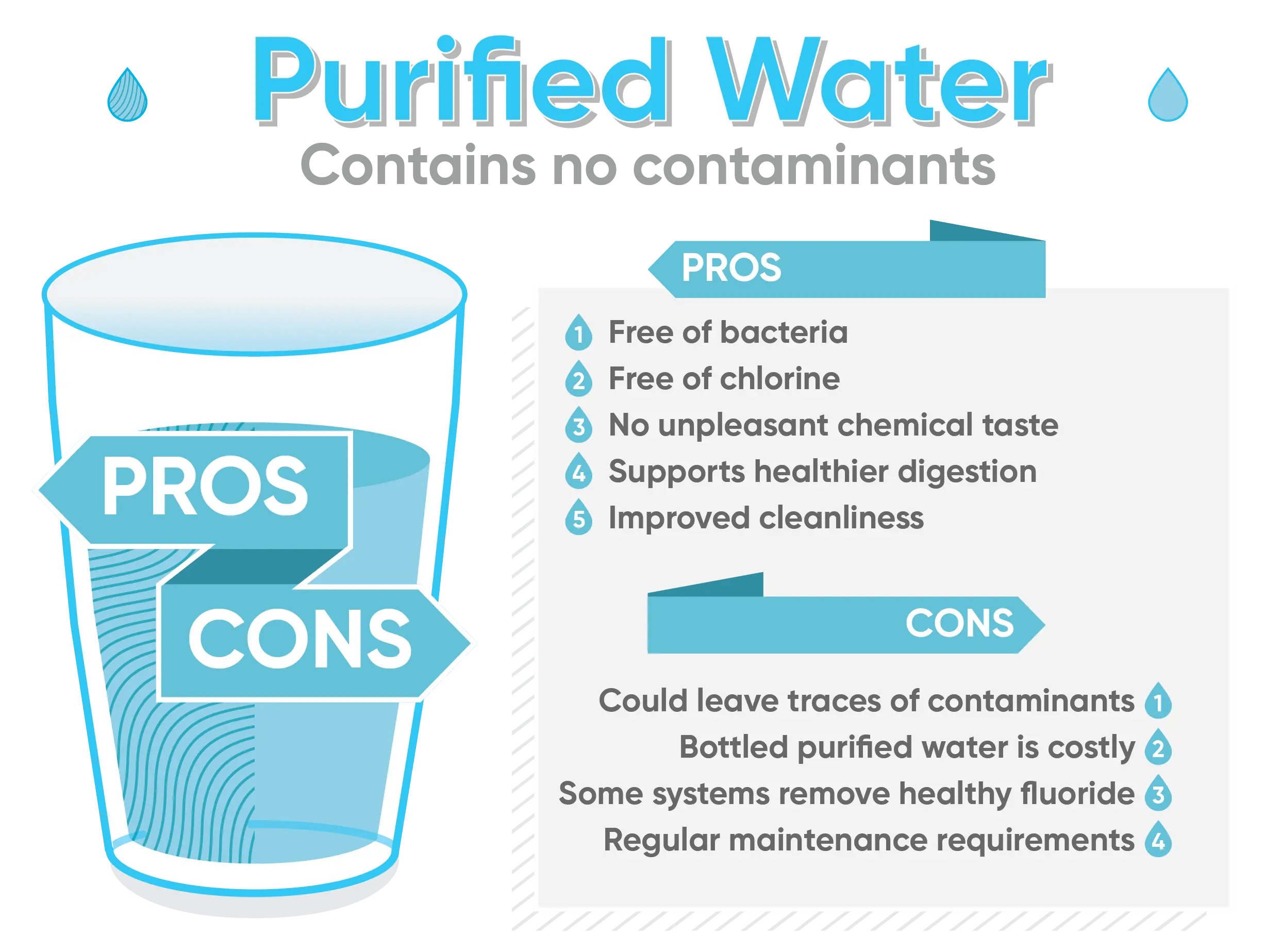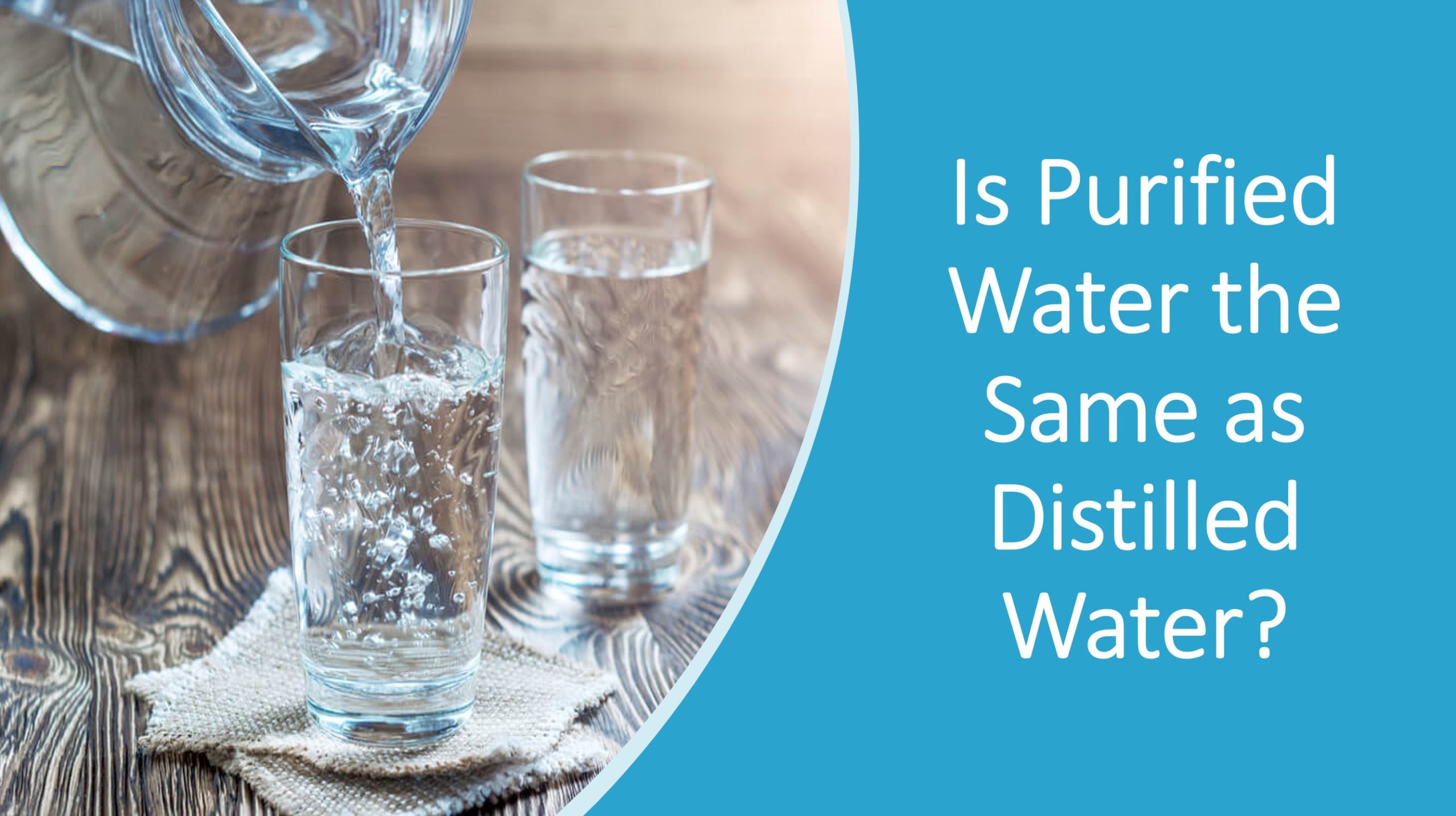Purified Water Vs Distilled Water: Understanding The Key Differences
When it comes to choosing the right type of water for your health and household needs, understanding the differences between purified water and distilled water is essential. Many people use these terms interchangeably, but they refer to distinct processes that result in water with unique properties. Purified water undergoes various filtration and treatment methods to remove impurities, while distilled water is produced by boiling water and condensing the steam back into liquid form. Both options have their advantages and limitations, making it important to explore their distinctions in detail.
Whether you're looking for water that’s safe to drink, suitable for medical use, or ideal for your appliances, knowing the purified water distilled water difference can help you make informed decisions. The quality of water you choose can impact your health, the longevity of your devices, and even the taste of your beverages. With so many options available, it’s crucial to understand what sets these two types of water apart.
As we dive deeper into this topic, we’ll explore the processes behind purified and distilled water, their benefits, and their drawbacks. By the end of this article, you’ll have a comprehensive understanding of which type of water suits your needs best. Let’s uncover the key factors that differentiate purified water from distilled water and how these differences can affect your daily life.
Read also:Victor Soare Cause Of Death Unveiling The Truth Behind His Passing
Table of Contents
- What is Purified Water?
- What is Distilled Water?
- How Are Purified Water and Distilled Water Different?
- Which is Better for Drinking: Purified or Distilled Water?
- Can Purified Water and Distilled Water Affect Your Health?
- Common Uses of Purified and Distilled Water
- How to Choose Between Purified and Distilled Water?
- Is Purified Water the Same as Distilled Water?
- Environmental Impact of Purified and Distilled Water
- Frequently Asked Questions About Purified and Distilled Water
What is Purified Water?
Purified water refers to water that has been treated to remove impurities, contaminants, and harmful substances. The purification process can involve several methods, including reverse osmosis, deionization, carbon filtration, and ultraviolet (UV) treatment. These techniques ensure that the water is free from bacteria, viruses, chemicals, and other pollutants, making it safe for consumption and various applications.
One of the key benefits of purified water is its versatility. It is widely used in households, laboratories, and industries due to its high level of cleanliness. However, it’s important to note that purified water doesn’t necessarily mean distilled water. While all distilled water is purified, not all purified water is distilled. This distinction is part of the purified water distilled water difference that we’ll explore further in this article.
Consumers often choose purified water for its clean taste and safety. It’s an excellent option for people who want to avoid contaminants commonly found in tap water. However, the purification process may also remove beneficial minerals, which is a consideration to keep in mind.
What is Distilled Water?
Distilled water is produced through a process called distillation, which involves boiling water to create steam and then condensing the steam back into liquid form. This method effectively removes impurities, including minerals, salts, and organic compounds, leaving behind pure water. Distilled water is often considered one of the purest forms of water available.
Because of its high level of purity, distilled water is commonly used in medical settings, laboratories, and industrial applications. It’s also a popular choice for steam irons, car batteries, and other appliances that require mineral-free water to prevent damage. However, the purified water distilled water difference becomes apparent when considering taste and mineral content.
While distilled water is free from impurities, it lacks minerals like calcium and magnesium, which are naturally present in some types of water. This can affect its taste and make it less appealing for everyday drinking. Additionally, long-term consumption of distilled water may lead to mineral deficiencies, as it doesn’t provide the essential nutrients found in other types of water.
Read also:Young Jason Statham The Early Years Of An Action Icon
How Are Purified Water and Distilled Water Different?
Understanding the purified water distilled water difference is crucial for making informed decisions about which type of water to use. While both types of water are treated to remove impurities, the methods and outcomes differ significantly. Purified water undergoes various filtration and treatment processes, while distilled water is produced through distillation.
Purified water retains some trace minerals depending on the purification method used, whereas distilled water is completely free of minerals and impurities. This difference affects their taste, nutritional value, and suitability for specific applications. For instance, purified water is often preferred for drinking due to its balanced mineral content, while distilled water is ideal for appliances and laboratory use.
Another key distinction is the cost and energy involved in production. Distillation requires more energy and resources compared to other purification methods, making distilled water more expensive to produce. These factors contribute to the purified water distilled water difference and influence consumer preferences.
Which is Better for Drinking: Purified or Distilled Water?
When it comes to choosing between purified water and distilled water for drinking, several factors come into play. Purified water is often considered a better option for everyday consumption because it retains trace minerals that contribute to its taste and nutritional value. These minerals, such as calcium and magnesium, are essential for maintaining good health.
On the other hand, distilled water is free from all impurities, including minerals. While this makes it extremely pure, it can also result in a flat taste that many people find unappealing. Additionally, long-term consumption of distilled water may lead to mineral deficiencies, as it doesn’t provide the essential nutrients found in other types of water.
Ultimately, the choice between purified and distilled water for drinking depends on your personal preferences and health needs. If you’re looking for water that’s safe, clean, and flavorful, purified water is likely the better option. However, if you need water for specific purposes, such as medical or industrial use, distilled water may be more suitable.
Can Purified Water and Distilled Water Affect Your Health?
The impact of purified water and distilled water on your health is an important consideration when choosing between the two. Purified water is generally safe for consumption and provides a clean, refreshing option for everyday use. Its filtration process removes harmful contaminants while retaining some beneficial minerals, making it a balanced choice for maintaining good health.
Distilled water, while pure and free from impurities, lacks minerals like calcium and magnesium. This can affect its nutritional value and potentially lead to mineral deficiencies if consumed exclusively over a long period. However, distilled water is often recommended for people with compromised immune systems or those who need water free from all contaminants.
Understanding the purified water distilled water difference is essential for making health-conscious decisions. While both types of water are safe to drink, their mineral content and potential health effects should be taken into account. Consulting with a healthcare professional can help you determine which type of water is best for your specific needs.
Common Uses of Purified and Distilled Water
Purified water and distilled water serve a wide range of purposes due to their high levels of cleanliness and purity. Purified water is commonly used for drinking, cooking, and making beverages like coffee and tea. Its clean taste and safety make it a popular choice for households and restaurants.
Distilled water, on the other hand, is often used in medical and laboratory settings where purity is critical. It’s also ideal for appliances like steam irons, humidifiers, and car batteries, as it prevents mineral buildup and damage. The purified water distilled water difference becomes evident in their applications, with each type of water serving specific needs.
Additionally, both types of water are used in industries such as pharmaceuticals, cosmetics, and electronics manufacturing. Their purity ensures consistent quality and performance, making them indispensable for various professional and personal uses.
How to Choose Between Purified and Distilled Water?
Choosing between purified water and distilled water depends on your specific needs and preferences. If you’re looking for water that’s safe, clean, and flavorful for everyday use, purified water is likely the better option. Its balanced mineral content and clean taste make it ideal for drinking and cooking.
If you need water for specialized purposes, such as medical treatments, laboratory experiments, or appliance maintenance, distilled water may be more suitable. Its complete lack of impurities ensures optimal performance and prevents damage caused by mineral buildup.
Understanding the purified water distilled water difference can help you make an informed decision. Consider factors such as taste, mineral content, cost, and intended use when choosing between the two. By evaluating your needs, you can select the type of water that best meets your requirements.
Is Purified Water the Same as Distilled Water?
Many people wonder whether purified water is the same as distilled water, but the answer is no. While both types of water are treated to remove impurities, their production methods and properties differ significantly. Purified water undergoes various filtration and treatment processes, while distilled water is produced through distillation.
The purified water distilled water difference lies in their mineral content and applications. Purified water retains some trace minerals, making it more flavorful and nutritious, while distilled water is completely free of minerals and impurities. This distinction affects their taste, nutritional value, and suitability for specific uses.
Understanding these differences can help you choose the right type of water for your needs. Whether you’re looking for water to drink, cook with, or use in appliances, knowing the purified water distilled water difference is essential for making informed decisions.
Environmental Impact of Purified and Distilled Water
The production of purified water and distilled water has varying environmental impacts. Purified water typically involves filtration and treatment processes that are less energy-intensive compared to distillation. This makes purified water a more environmentally friendly option in terms of energy consumption and resource use.
Distillation, on the other hand, requires significant energy to boil water and condense steam, making it a less sustainable choice. Additionally, the production of distilled water often results in waste, as impurities and minerals are removed and discarded. These factors contribute to the environmental footprint of distilled water.
When considering the purified water distilled water difference, it’s important to weigh their environmental impacts. Choosing purified water over distilled water can help reduce energy consumption and minimize waste, making it a more sustainable option for everyday use.
Frequently Asked Questions About Purified and Distilled Water
Here are some common questions people have about purified water and distilled water:
- What is the main difference between purified water and distilled water? The main difference lies in their production methods and mineral content. Purified water undergoes filtration and treatment, while distilled water is produced through distillation.
- Can I use purified water in my appliances? Yes, purified water is safe for most appliances, but distilled water is often preferred for devices that require mineral-free water.
- Is distilled water safe to drink every day? While distilled water is safe to drink, its lack of minerals may affect its taste and nutritional value.
- Which type of water is better for the environment? Purified water is generally more environmentally friendly due to its lower energy requirements and reduced waste production.
By addressing these questions, you can gain a better understanding of the purified water distilled water difference and make informed choices based on your needs.
Vamillagift.com: Your Ultimate Destination For Unique And Thoughtful Gifts
Vinila Gift.com: Your Ultimate Destination For Unique And Thoughtful Gifts
How To Know The Real Gold: A Complete Guide To Identifying Authentic Gold

Distilled Water vs Purified Water Quench Water

Distilled Water vs Purified Water Comparison Are They The Same?